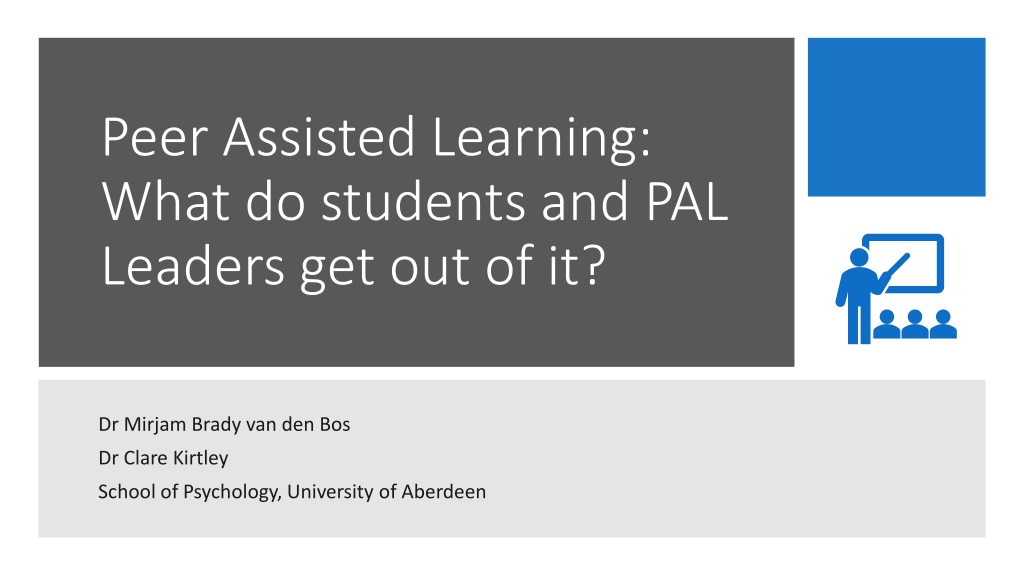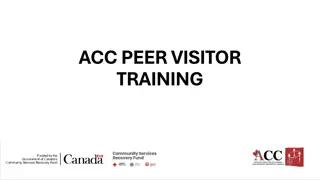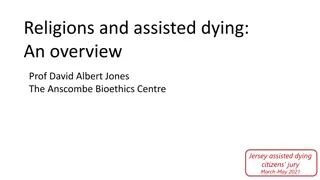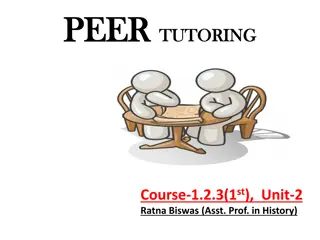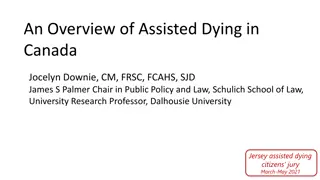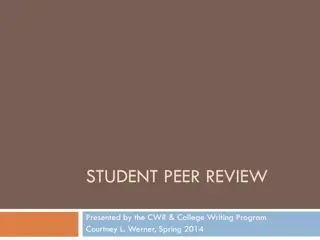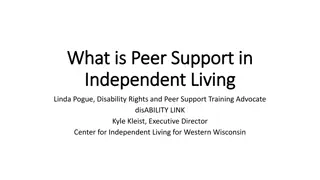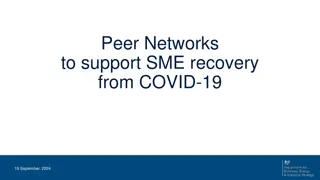Benefits of Peer Assisted Learning
Peer Assisted Learning (PAL) offers advantages for both students and PAL leaders, enhancing academic performance, reducing stress, improving social integration, and fostering teamwork skills. Students benefit from higher grades, while leaders gain communication skills and positive attitudes. Despite the benefits, some challenges like specific learning approaches may arise. PAL aligns with education theories promoting academic and social integration.
Uploaded on Feb 22, 2025 | 0 Views
Download Presentation

Please find below an Image/Link to download the presentation.
The content on the website is provided AS IS for your information and personal use only. It may not be sold, licensed, or shared on other websites without obtaining consent from the author.If you encounter any issues during the download, it is possible that the publisher has removed the file from their server.
You are allowed to download the files provided on this website for personal or commercial use, subject to the condition that they are used lawfully. All files are the property of their respective owners.
The content on the website is provided AS IS for your information and personal use only. It may not be sold, licensed, or shared on other websites without obtaining consent from the author.
E N D
Presentation Transcript
Peer Assisted Learning: What do students and PAL Leaders get out of it? Dr Mirjam Brady van den Bos Dr Clare Kirtley School of Psychology, University of Aberdeen
Peer Assisted Learning Students receive assistance and support from non-professional lecturers I.e. other students Topper & Ehly (2001) outline different approaches: Peer tutoring, mentoring, counselling, assessment Peer tutoring (some students take the role of tutor to help others) is the most common PAL: What is it?
PAL sessions can potentially benefit both student attendees and student leaders Higher grades in students who attend PAL Ashwin, 2003; Cheng & Walters, 2009; Glynn et al, 2006 Broader benefits Reduction of stress (Glynn et al, 2006) Deeper approach to learning (Ladyshewsky and Gardner, 2008) Smoother transition into university (Dawson et al, 2014; Byl et al, 2015) Better social/academic integration, which benefits ongoing development of learning skills (Tinto & Pusser, 2006) The pros of PAL: Students
Evidence PAL Leaders experience their own benefits Development of teamwork and communication skills Conelan, 1999; Ashwin, 2003 Changing views of learning, as a more social process Ashwin, 2003 Re-learning through reviewing work Capstick, 2004 More positive attitudes towards future social responsibilities Hodgson et al, 2014 The pros of PAL: Leaders
The cons of PAL? Potential pit-falls of PAL sessions: Students marks increase due to learning specific approaches to assignments, rather than how they approach learning (Ashwin, 2004) Students may be put off from attending if they perceive the PAL Leaders as having low expertise (Capstick, 2004)
Several broader education theories indicate why PAL might have an impact Increased academic/social integration (Tinto, 1992) Modelling of successful learning strategies from leaders (Vygotsky, 1968) Reduced social distance in the relationship between tutor and tutee (Lave & Wenger, 1995) Theories of PAL
PAL runs for each year of UG study and Psychology conversion course Leaders are students in the year(s) above MSc: 4thyear students L4 PAL: PG students 3-4 Leaders per year group One PAL Team Leader, elected by other leaders PAL Co-Ordinator: member of staff who facilitates admin aspects PAL in the School of Psychology
Focus: Curriculum/Pastoral Content: Lecturer determined/Student determined Occurs: Consistently/Ad hoc Open to: All students/Students who are struggling Attendance: Voluntary/Compulsory PAL Leaders: Paid/Volunteers Staff involvement: Minimal/High PAL in the School of Psychology
Previous work has shown the benefits PAL can have for students and leaders Do we see similar outcomes here? Most PAL schemes are aimed at first year students Do students (both attendees and leaders) in different years get similar benefits from PAL? The current study
Nov-Dec 2021: Quantitative questionnaires Students attending PAL Current PAL Leaders Participants asked to rate their agreement with several statements on how they feel PAL has contributed to aspects of learning Methods Thinking about the PAL sessions you have attended/led, how much do you agree that they contributed to the following points? Students increased understanding of concepts in Psychology? Your own increased understanding of concepts in Psychology? Increased understanding of basic concepts in Psychology Better understanding what the lecturers expect from you in assignments? How you settled into university? STUDENTS LEADERS
Spring 2022: Qualitative focus groups Students attending PAL Current PAL Leaders Questions expand on initial survey: Students: reasons for attending PAL; perceived effects of the sessions; expectations around PAL Leaders: reasons for becoming a leader; preparation for sessions; view of role in sessions Methods
Part 1 Results: Leaders 6 participants Mage = 21.5; 2 males 3rd and 4th year students Leaders for L2 and L3 On their own experiences, Leaders felt PAL had helped with Their confidence Their study approach Their feelings of belonging to the School of Psychology
Part 1 Results: Leaders On their judgement of how PAL affected students who attended Leaders felt that PAL helped students with all these points: Assignment marks Approach to study Feeling of belonging Grasp of concepts Settling into university
Part 1 Results: Students 27 Students Mage= 23.19, 4 males 6 1st years, 8 2nd years, 5 3rd years, 3 4th years, 5 ND
Consistent pattern across all questions, some of which are significant Third year students show less agreement that PAL contributes to these aspects, compared to first and second years Part 1 Results: Students PAL helps me understand what my lecturers expect from me for assignments PAL helps me understand what my lecturers expect from me across the course
Consistent pattern across all questions, some of which are significant Third year students show less agreement that PAL contributes to these aspects, compared to first and second years Part 1 Results: Students PAL increased my feeling of belonging to the School of Psychology PAL contributed to how I settled into my course
Interviews with students attending PAL (watch this space) Interviews with PAL leaders (3) PAL research qualitative data Interviewed through Teams by Dr Aaron Thom Data analysis: Contextualist Thematic Analysis (Braun & Clarke, 2006) - Descriptive - Also latent and interpretative
Questions we asked them: Could you tell me why you initially signed up to be a PAL leader?
Questions we asked them: Could you tell me why you initially signed up to be a PAL leader? Could you describe to me how you typically preparefor a session? And once you re in the session, how do you go about it?
Questions we asked them: Could you tell me why you initially signed up to be a PAL leader? Could you describe to me how you typically preparefor a session? And once you re in the session, how do you go about it? Now when you re tutoring, when you re in the session, how do you know what to do?
Questions we asked them: Could you tell me why you initially signed up to be a PAL leader? Could you describe to me how you typically preparefor a session? And once you re in the session, how do you go about it? Now when you re tutoring, when you re in the session, how do you know what to do? This may be a bit of a hard question, so don t worry if you can t answer it straight away, but what do you think learning is? What happens to a person when they learn? And along the same lines, what do you think teaching is?
Questions we asked them: Could you tell me why you initially signed up to be a PAL leader? Could you describe to me how you typically preparefor a session? And once you re in the session, how do you go about it? Now when you re tutoring, when you re in the session, how do you know what to do? This may be a bit of a hard question, so don t worry if you can t answer it straight away, but what do you think learning is? What happens to a person when they learn? And along the same lines, what do you think teaching is? Now I d like to ask you some specific questions about your experiences. Could you describe to me a moment during your time as PAL leader that was particularly positive? Why was it so positive?
Questions we asked them: Could you tell me why you initially signed up to be a PAL leader? Could you describe to me how you typically preparefor a session? And once you re in the session, how do you go about it? Now when you re tutoring, when you re in the session, how do you know what to do? This may be a bit of a hard question, so don t worry if you can t answer it straight away, but what do you think learning is? What happens to a person when they learn? And along the same lines, what do you think teaching is? Now I d like to ask you some specific questions about your experiences. Could you describe to me a moment during your time as PAL leader that was particularly positive? Why was it so positive? And could you describe a moment that you would rather forget?
Questions we asked them: Could you tell me why you initially signed up to be a PAL leader? Could you describe to me how you typically preparefor a session? And once you re in the session, how do you go about it? Now when you re tutoring, when you re in the session, how do you know what to do? This may be a bit of a hard question, so don t worry if you can t answer it straight away, but what do you think learning is? What happens to a person when they learn? And along the same lines, what do you think teaching is? Now I d like to ask you some specific questions about your experiences. Could you describe to me a moment during your time as PAL leader that was particularly positive? Why was it so positive? And could you describe a moment that you would rather forget? We often talk about the effects of PAL on the students who attend it as tutees, but we re also interested to see if there are any effects on the PAL leaders as well. Speaking from your experience, do you think there are any effects on you as well?
Questions we asked them: Could you tell me why you initially signed up to be a PAL leader? Could you describe to me how you typically preparefor a session? And once you re in the session, how do you go about it? Now when you re tutoring, when you re in the session, how do you know what to do? This may be a bit of a hard question, so don t worry if you can t answer it straight away, but what do you think learning is? What happens to a person when they learn? And along the same lines, what do you think teaching is? Now I d like to ask you some specific questions about your experiences. Could you describe to me a moment during your time as PAL leader that was particularly positive? Why was it so positive? And could you describe a moment that you would rather forget? We often talk about the effects of PAL on the students who attend it as tutees, but we re also interested to see if there are any effects on the PAL leaders as well. Speaking from your experience, do you think there are any effects on you as well? Finally, for any new student becoming a PAL leader, what advice would you give them?
Themes and thoughts so far An unsurprising theme: Being PAL leader has benefits for oneself Affective I don t know if this is like an ego thing or not but it feels nice to have helped someone figure something out Cognitive I think that kind of mentoring people on what to do academically is a very good way to actually learn better
More interesting themes: We are not lecturers
More interesting themes: We are not lecturers PAL leaders don t want to be called tutors I don t really like to call what I do in PAL tutoring because I really strongly believe in the peer-led power of PAL ok I call the other people the other students that attend simply other students ok because you re in this position where you are tutoring let s say for lack of a better word that it s easy to fall into this role of being a teacher or like lecturer when actually that s not what we re here to do
More interesting themes: We are not lecturers PAL leaders don t want to be called tutors I don t really like to call what I do in PAL tutoring because I really strongly believe in the peer-led power of PAL ok I call the other people the other students that attend simply other students ok because you re in this position where you are tutoring let s say for lack of a better word that it s easy to fall into this role of being a teacher or like lecturer when actually that s not what we re here to do Student centered approach during session we re always being reactive to the needs of the current students so our sessions are always built to be as flexible as possible
More interesting themes: We are not lecturers PAL leaders don t want to be called tutors I don t really like to call what I do in PAL tutoring because I really strongly believe in the peer-led power of PAL ok I call the other people the other students that attend simply other students ok because you re in this position where you are tutoring let s say for lack of a better word that it s easy to fall into this role of being a teacher or like lecturer when actually that s not what we re here to do Student centered approach during session we re always being reactive to the needs of the current students so our sessions are always built to be as flexible as possible Based on PAL leaders own experience as students I m a student just as you are I ve been here before and this is what I think
PAL leaders have well-developed ideas of teaching and learning I think learning broadens an individual s sense of being you know and self so I think yeah I think learning is like expanding who you are in some beneficial way teaching is somehow empowering students to then do and be themselves you know what I mean rather than just teaching for learning s sake or for knowledge s sake it s actually about making sure that students know what to do with their knowledge learning to me is always just finishing the day saying I ve gone forward to achieve my final goals in some respect
PAL Leaders Benefits for confidence, belonging, and approach to working Agreement with previous findings But maybe NOT: modelling learning strategies Students Similar feeling that PAL benefits them More pronounced for earlier years (1st/2nd)- and 4th years Most useful at the points where a major new aspect is introduced? Less impact on socialisation- a casualty of the restrictions? Thoughts so far
Continue to interview more leaders/students on their experiences! Further exploration of the differences between years of study What s next? Future work: PAL Leaders and learning to learn Online PAL vs offline PAL?
